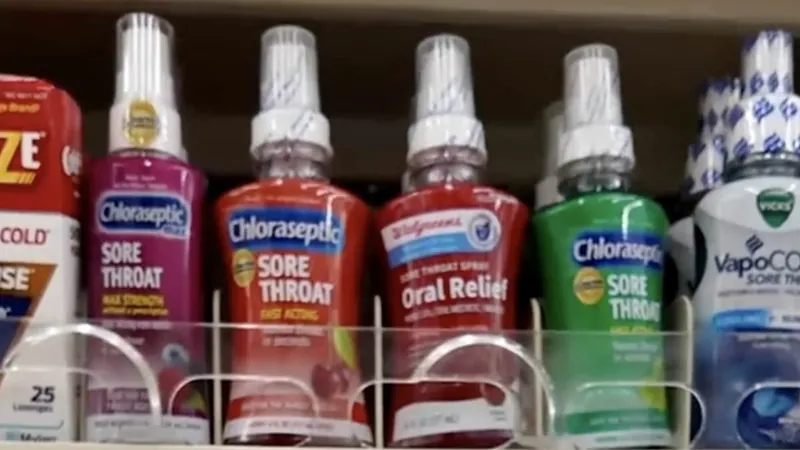
Beware! These Popular Cold and Flu Medications Might Be Doing You More Harm Than Good This Winter!
2024-12-09
Author: Wai
Introduction
As the chill of winter sets in, bringing with it the familiar sniffles and sneezes, many rush to their local pharmacy for relief. However, a well-known pharmacist, Dr. Grant Harting, is raising red flags over several commonly used cold and flu medications that may not be as effective as advertised.
Critique of Popular Medications
Taking center stage in Dr. Harting’s critique is Theraflu, a product that many believe could help alleviate their symptoms. Priced at $11.99, Dr. Harting reveals in a viral TikTok video that this syrup primarily combines acetaminophen, a mild pain reliever, with guaifenesin—a questionable ingredient for treating chest congestion. His humorous yet pointed remark questioning its efficacy is a wake-up call for consumers looking for genuine relief.
Next on his hit list is Vicks NyQuil Severe Cold & Flu capsules, available for $16.99 per pack of 24. Dr. Harting acknowledges that despite its widespread popularity and appealing packaging, the composition doesn’t offer much comfort. The capsules contain the same active ingredients as Theraflu but add doxylamine, an antihistamine, and phenylephrine, which Dr. Harting dismisses as ineffective. Observing the plethora of NyQuil options, he humorously compares the scene to a 'dystopian pharmacist's nightmare.'
He also critiques other over-the-counter medications like Mucinex and Delsym, stating that they are equally unhelpful. Citing research that shows no significant difference in cough relief between Delsym and a placebo for individuals with respiratory infections, he strengthens his appeal for greater consumer awareness.
Questionable Remedies
Dr. Harting doesn’t hold back on his thoughts about Boiron Oscillococcinum either, calling it 'the worst' cold remedy available. This homeopathic treatment, which has seen annual sales exceeding $20 million in the U.S., is derived from the heart and liver of wild ducks—a fact that certainly raises eyebrows. 'This is literally nothing,' Dr. Harting proclaims as he vows to put this remedy to the test during this flu season.
Another product facing scrutiny is Sudafed PE. Retailing at $21.99, this variant contains phenylephrine as its primary ingredient—a drug the FDA recently proposed to remove from nonprescription cold and flu medications due to findings that it fails to provide relief. The agency's ongoing evaluation, which began in March 2023, suggests this common decongestant is no more effective than a placebo, raising questions about the validity of popular cold remedies.
Advocacy for Informed Choices
In light of this therapeutic fiasco, Dr. Harting advocates for a surprising alternative: zinc oxide. Some studies indicate that zinc can potentially reduce the severity and duration of cold symptoms. However, the Mayo Clinic reminds consumers that research remains inconsistent regarding its effectiveness, and guidelines suggest keeping daily intake below 40 mg.
With these insights, Dr. Harting urges consumers to reconsider their go-to medications and consult healthcare professionals before reaching for familiar brands that may not deliver on their promises. As cold and flu season continues to grip the nation, the call for informed choices in treating symptoms has never been more critical. Stay healthy this winter—your body will thank you!


 Brasil (PT)
Brasil (PT)
 Canada (EN)
Canada (EN)
 Chile (ES)
Chile (ES)
 España (ES)
España (ES)
 France (FR)
France (FR)
 Hong Kong (EN)
Hong Kong (EN)
 Italia (IT)
Italia (IT)
 日本 (JA)
日本 (JA)
 Magyarország (HU)
Magyarország (HU)
 Norge (NO)
Norge (NO)
 Polska (PL)
Polska (PL)
 Schweiz (DE)
Schweiz (DE)
 Singapore (EN)
Singapore (EN)
 Sverige (SV)
Sverige (SV)
 Suomi (FI)
Suomi (FI)
 Türkiye (TR)
Türkiye (TR)